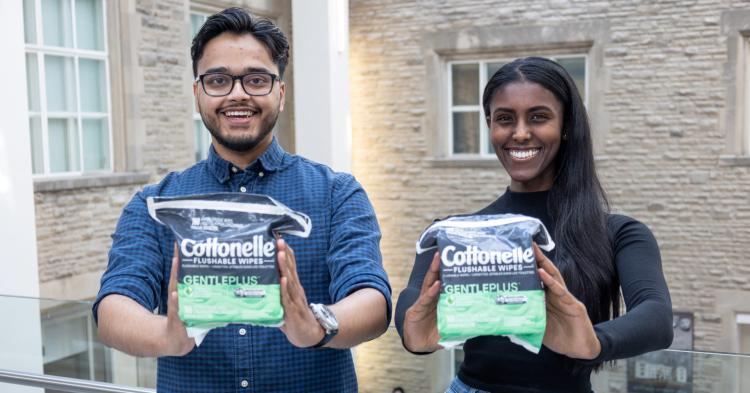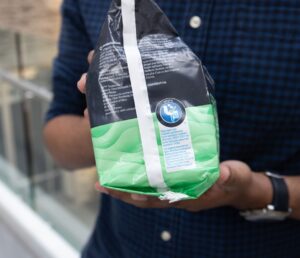
Reuben Mathew and Hanna Maekebay, fourth-year biology students, worked with the City of London on an ongoing project related to flushable wipes. (Mitch Zimmer/Western Science)
If flushable wipes seem too good to be true, it's because, for the most part, they are. Nearly all of the flushable wipes on the market are not biodegradable and clog sewer systems, costing taxpayers thousands of dollars.
Western biology students Hanna Maekebay and Reuben Mathew spent a semester working with the City of London to tackle the problem through their fourth-year community-engaged learning project.
"People are spending hundreds of dollars on plumbing issues only to find out their supposedly flushable wipes are not flushable. But at that point, it's too late. It's an ongoing issue," Maekebay said.
Barry Orr, sewer outreach and control inspector at the City of London, has worked with many groups of Western students amid a long-term effort to drive change with wipe manufacturers and international organizations.
This year, he's feeling especially hopeful.
Orr is one of the wastewater experts appointed by the Standards Council of Canada to advocate for a flushability standard for wipes at the International Organization for Standardization (ISO).
The data Maekebay and Mathew collected in a survey on community attitudes and awareness of flushable wipes became a crucial element in his push for international standards, such as a universal "do not flush" logo.
"The data said exactly what we were expecting. If you use a clear, red logo (the prohibition symbol), people recognize that as do not flush,'" Orr said.

The current recommended logo, from the International Water Services Flushability Group (IWSFG), is not recognizable, participants said.
Orr presented the survey results to manufacturers through his work with the ISO.
"This was so valuable. It was the first time we've been able to stand up in front of the manufacturers and say your logo is not working.' We need to go with universal black, white and red. No more fancy inset colours," Orr said.
"This was the opportunity for us. We actually got uptake from the manufacturers, to agree let's do this international do not flush logo.' It's pretty exciting."
Student contributions drive progress
It's tough to drive change in a large industry, Orr said. He recognized Maekebay and Mathew for their work collecting that key data, noting there was a "good participation rate" through their online survey.
The results brought clarity to the problem.
"We learned consumers are confused about whether a wipe that is marketed as flushable will degrade. They want packaging that clearly indicates if the wipe is in fact flushable because they don't want to contribute to the problem." - Reuben Mathew, fourth-year biology student
But respondents seemed to connect with two simplified logos that show what's OK to flush and what's not. Maekebay and Mathew used the information to develop an awareness campaign in hopes of changing consumer behaviour around purchase and use of flushable wipes.

Reuben Mathew shows the existing logo to indicate to a wipe is safe to flush. The data Mathew and Maekebay collected suggests the logo is not recognizable by consumers. (Mitch Zimmer/Western Science)
"Even with flushable wipes that do degrade, the packaging advises not to flush more than one or two wipes at a time. That's because they don't break down the same way that toilet paper does," Maekebay said.
"It's important for the community to understand not only which wipes are flushable, but also how to properly use them."
Maekebay and Mathew's work has also been used by the Canadian Water and Wastewater Association and in media reports to encourage citizens to look for the IWSFG logo on products. It also helped inform city councillors on the flushability issue.
Western's collaboration with the City of London on flushable wipe research has been ongoing for almost 10 years, through a multi-disciplinary approach with both the Faculty of Science and the Faculty of Health Sciences.
Orr said the need for clear, universal symbols is only growing as wipes continue to explode with popularity.
"Wipes are exponentially growing in consumer use. There's wipes for everything now, whether it's your bum, face, glasses, tires, countertops. Most wipes are not flushable, they should never, ever be flushed," Orr said.
"Protecting the sewer system and your own plumbing is what's at stake."












